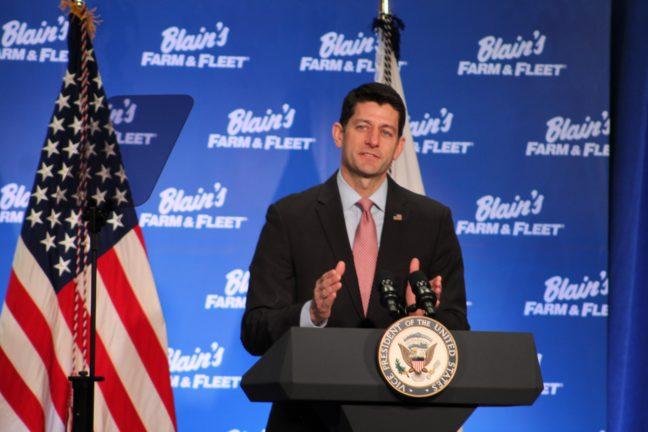So far, so good with tax reform. Republicans in the House of Representatives and the Senate have both passed much-needed tax bills to improve the American economy. Both houses of Congress are now expected to vote on motions for a conference to sort out their differences.
Alarmed at the progress being made with tax reform, the Democrats are making the same arguments they’ve been using for decades whenever a tax cut is passed. From Nancy Pelosi calling it the “worst bill in history” to the University of Wisconsin College Democrats, the opposition’s criticisms of the tax cut are exactly what you’d expect: That it’s a massive giveaway to the rich while hurting middle and lower income families, it increases the deficit and will eventually lead to a recession.
When it comes to taxing the rich, the facts show that they actually pay more in revenue in the long-term after tax cuts. Economists who have researched previous periods of tax reductions, such as conservative Hoover Institution senior fellow Thomas Sowell, have found that top income earners invest their capital back into the economy when the incentives are there.
Point Counterpoint: Tax reform a victory for middle class Americans
When looking into former
President Woodrow Wilson’s tax hikes, Sowell noticed the number of people reporting incomes of $1 million or more declined from 206 in 1916 to 21 by 1921. That was the year Republican Warren G. Harding was inaugurated president. Under he and his successor Calvin Coolidge, the top income tax rate was slashed from 73 percent to 25 percent. By 1925, there were 207 people who reported $1 million or more in income. The federal government collected $700 million in income taxes in 1921. By 1929, more than $1 billion was collected in taxes.
The same thing happened with tax cuts proposed by John F. Kennedy and implemented by Lyndon B. Johnson in the 1960s. Taxes paid by the wealthiest Americans exceeded what was projected by substantial margins. Revenue collected from the poorest Americans slightly decreased. When Ronald Reagan became president, there were similar results.
Opponents of Republican tax reform are concerned the middle class and the poor will be hurt because it targets various deductions, but they fail to account the dynamic impact of what happens if the legislation is implemented. In analyzing the Senate’s Tax Cuts and Jobs Act, the Tax Foundation — a slightly conservative think tank — projected that an additional 925,000 full-time equivalent jobs would be created along with an increase of 2.9 percent in wages and 3.7 percent in GDP long-term. The point of tax reform has never been to reward the richest few, but to increase opportunity for everyone.
Republican party needs tax reform almost as much as America does
When it comes to the deficit, it’s important to realize that tax rates and tax revenues are not the same thing. They can move perpendicularly or parallel depending on the health of the economy. Secondly, a great deal of the deficit problem has to do with government spending, which needs to be curtailed if we ever want a balanced budget again.
During the “Roaring 20s,” tax cuts did not lead to more debt. From 1921 to 1929, real GDP increased at an annual rate of 4.8 percent and the national debt went down from nearly $24 billion to $16.9 billion. During the two other major periods of tax reductions — in the 1960s and the 1980s — the debt climbed upward despite surging growth. The former was the decade of Medicare, Medicaid and the Vietnam War. The latter involved a military spending build-up amid the Cold War.
George W. Bush also signed tax cuts early into his presidency and had a debt problem, but this was also largely due to spending. By 2006, The New York Times reported tax revenues were rising higher than the administration predicted, mostly from corporations.
Now, what about those recessions that came after the big booms? Aren’t they a sign that a supply-side strategy to grow the economy is dangerous? The problem with this argument is that booms and busts are simply natural in any economy. What matters is how the government is going to respond.
Herbert Hoover didn’t follow the growth recipe established by his predecessors Harding and Coolidge. He created the Great Depression by starving the economy of capital through the Smoot-Hawley tariff, the Revenue Act of 1932 (raising the top income tax rate from 25 percent to 63 percent) and enlarging government spending from $3.3 billion in 1930 to $4.6 billion in 1932. That’s why almost a quarter of the labor force was unemployed by the end of his presidency.
It’s also important to acknowledge the economic conditions before tax cuts are passed. Until Kennedy became president, the United States suffered from a series of recessions in the post-World War II period. In January 1953, President Dwight D. Eisenhower started his presidency with an unemployment rate of 2.9 percent. He left with an unemployment rate of 6.6 percent. Real GDP growth under his tenure was only 2.72 percent (compared to 5.01 percent under JFK and Johnson). The top income tax rate under him was 91 percent.
The reason tax cuts are passed in the United States is because they work. Liberals can continue making the same old arguments they’ve been making for years, but that won’t get them anywhere. Their inability to prove their point means they should just step aside and let the tax cuts pass anyway. The boom times are on the way.
John Graber ([email protected]) is a senior majoring in history and political science.




















